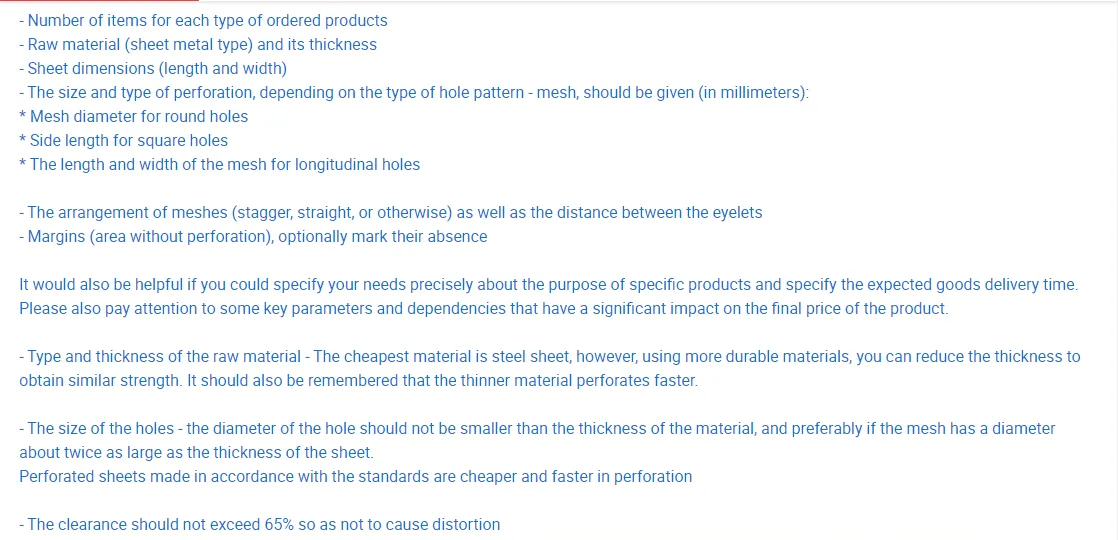The Art and Utility of Decorative Perforated Sheets
In the realm of architectural design and interior decoration, decorative perforated sheets have emerged as a versatile and innovative solution that blends aesthetic appeal with functional utility. These sheets, characterized by an array of holes or patterns, can serve diverse purposes in both commercial and residential settings. Their unique capability to offer privacy, enhance ventilation, and create striking visual effects makes them an increasingly popular choice among designers and architects.
Understanding Decorative Perforated Sheets
Decorative perforated sheets are typically made from metals such as aluminum, stainless steel, or copper, although they can also be manufactured from plastics. The perforation process involves creating holes in the sheet, which can vary in size, shape, and spacing. This customization allows for the creation of intricate patterns and designs that can complement a wide range of architectural styles.
The perforations not only contribute to an attractive façade but also help manage light and air flow. This makes these sheets an ideal choice for applications such as sunshades, room dividers, and acoustic panels. Furthermore, they can be used in signage, furniture design, and as part of building exteriors—showcasing their multifunctionality.
Aesthetic Appeal
One of the most significant advantages of decorative perforated sheets is their aesthetic versatility. Designers can select from countless designs, whether they desire a sleek, modern look or something more ornate and traditional. The ability to combine different materials and finishes with various hole patterns opens up endless creative possibilities.
For instance, a perforated sheet with a floral pattern can soften the stark lines of a contemporary building, while geometric designs can evoke a sense of modern sophistication. When backlit, these sheets can cast enchanting shadows, adding depth to spaces and creating an atmosphere that transforms environments.
decorative perforated sheet

Functional Benefits
Beyond their beauty, decorative perforated sheets are particularly valued for their functional benefits. In construction, they can provide effective screening or shading, reducing glare and heat gain in buildings. This not only enhances comfort for occupants but can also lead to reduced energy costs by minimizing reliance on heating and cooling systems.
This functionality extends to enhancing acoustics in various settings. They can be strategically placed to absorb sound, making them ideal for public spaces like concert halls or busy restaurants where sound management is crucial. The perforated design allows sound waves to travel through, minimizing echo and creating a more pleasant auditory experience.
Sustainability Aspect
With the global shift towards sustainable building practices, decorative perforated sheets present an eco-friendly choice. Many manufacturers utilize recyclable materials, and their application often contributes to energy efficiency. By allowing natural light to penetrate while providing shade, these sheets help reduce the need for artificial lighting and climate control.
Conclusion
In conclusion, decorative perforated sheets represent a fascinating fusion of art and engineering. Their ability to serve practical functions while enhancing visual appeal makes them an invaluable asset in the fields of architecture and design. As sustainability remains a pressing concern in modern construction, the role of such materials is poised to grow even further. Whether used as a sleek façade, a functional room divider, or an imaginative feature in interior design, decorative perforated sheets showcase the limitless possibilities when creativity meets practicality. As designers continue to explore this material, we can expect to see innovative applications that push the boundaries of traditional design, transforming spaces and elevating the overall aesthetic of our built environment.
-
Why Galvanized Trench Cover Steel Grating Resists Corrosion
NewsJul.10,2025
-
The Versatility and Strength of Stainless Expanded Metal Mesh
NewsJul.10,2025
-
Load Calculations in Steel Grating Platforms
NewsJul.10,2025
-
Keeping Pets and Kids Safe with Chicken Wire Deck Railing
NewsJul.10,2025
-
Hole Diameter and Pitch for Round Perforated Metal Sheets
NewsJul.10,2025
-
Aluminium Diamond Mesh in Modern Architecture
NewsJul.10,2025
Subscribe now!
Stay up to date with the latest on Fry Steeland industry news.

